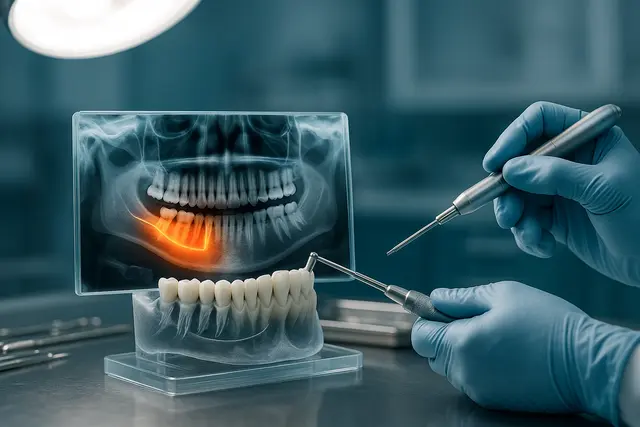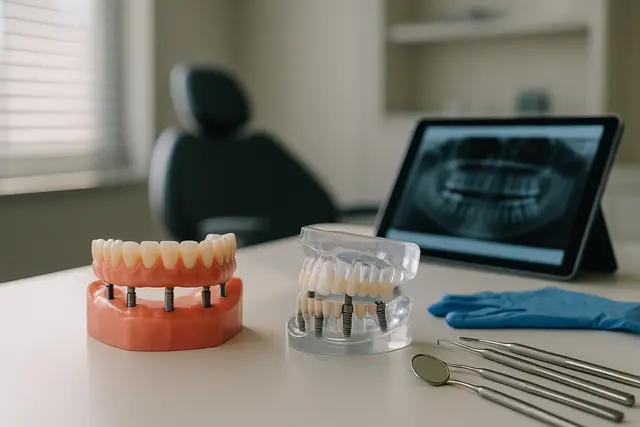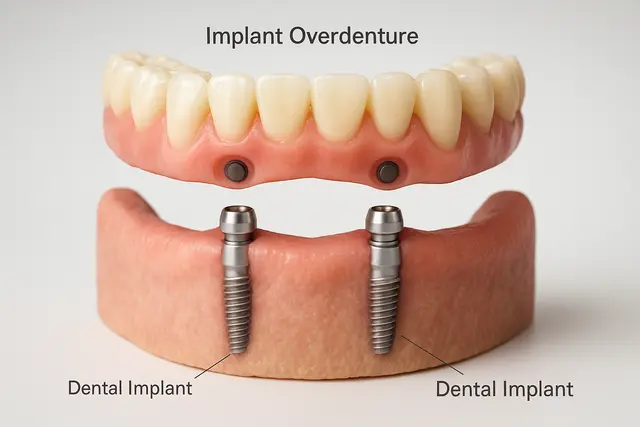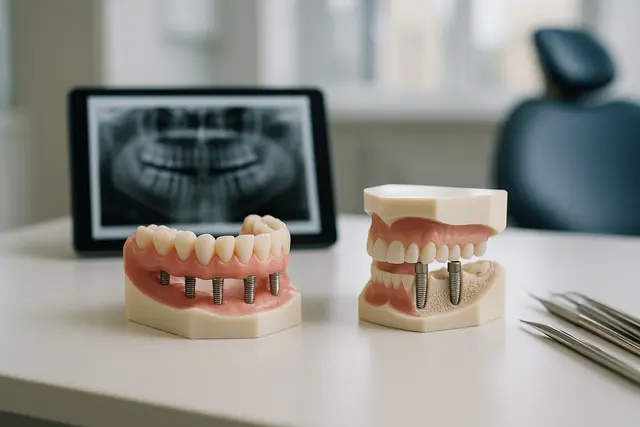Prosthodontics
6 min read
Oct 09, 2025
Dental Implant Surgery: Nerve Damage Risk
Dental implants are a revolutionary solution for replacing missing teeth, offering both function and aesthetics. But like any surgical procedure, they come with potential risks, one of the most concerning being nerve damage. Understanding the causes, symptoms, and prevention of this complication is essential for anyone considering implant surgery.

So, you’re thinking about getting a dental implant. Maybe you’ve lost a tooth in an epic popcorn mishap or your dentist said it’s time for a serious upgrade. Whatever the reason, dental implants are a modern miracle, strong, natural-looking, and long-lasting. But let’s not gloss over one of the more nerve-wracking concerns (pun intended): nerve damage.
Before you picture your jaw going numb forever or panic-Google "nerve injuries from dental implants," take a breath. We're going to walk through the real deal, risks, signs, recovery, and everything your dentist should be explaining clearly.
Let’s pull the curtain back on what you actually need to know about dental implants and nerve damage.
What You Need to Know About Dental Implant Surgery
Dental implant surgery is more than just screwing in a fake tooth. It’s a precise, multi-step surgical procedure that involves placing a titanium implant into your jawbone, where it acts like a tooth root. Over time, it fuses with your bone, a process called osseointegration.
While this might sound futuristic (and slightly intense), dental implant procedures have a high success rate, typically above 95%. Most people sail through with nothing more than some bruising and swelling after surgery. But the mouth is packed with tiny nerves, and sometimes, they get a bit too close to the action.
The Implant Procedure and Where Things Can Go Sideways
During implant placement, especially in the lower jaw, there's a chance of encountering the inferior alveolar nerve or lingual nerve. These nerves are responsible for sensation in your lower lip, chin, tongue, and gums. If an implant fixture is positioned too close, or worse, presses or compresses the nerve, damage occurs.
And yes, nerve damage may sound terrifying. But here’s the key: it’s rare, especially when the surgery is handled by experienced dental surgeons who use high-tech imaging to map out exactly where those nerves live.
Still, the risk of nerve damage isn’t zero. It’s your right to understand the possible risks before heading into the implant site with a drill.
Signs of Nerve Damage You Shouldn’t Ignore
Let’s say you’ve just had your dental implant placement and everything seemed great… until your lip starts to tingle, and not in a romantic way.
Here are red flags that nerve damage from dental implants may have occurred:
Persistent numbness in the lower lip, chin, or tongue
A strange tingling sensation that won’t quit
Burning or electric-like shocks in the gums or around the implant
Loss of sensation (or weird hypersensitivity) in part of your mouth
Constant pain that seems unrelated to healing
These are potential signs of nerve damage following dental implant surgery. If you’re experiencing nerve-related issues, don’t assume it’s “just part of recovery.” Talk to your dentist immediately. The earlier the treatment, the better your odds of reversing any nerve injury.
How Nerve Injuries Happen During Dental Implant Procedures
Here’s a quick anatomy check. The inferior alveolar nerve, nestled inside your lower jawbone, runs through the mandibular canal. It's part of the larger trigeminal nerve system, responsible for sensations in your face. If the implant drill goes too deep or veers too close, it can injure a nerve through compression, stretching, or (worst-case) direct contact.
The nerve may result in symptoms ranging from mild tingling to severe pain and permanent damage. This doesn’t just hurt, it can seriously affect quality of life. Eating, speaking, kissing, everyday stuff becomes awkward or even unbearable.
Studies show nerve damage occurs most often when there’s a lack of proper imaging, rushed planning, or inexperience with the jawbone anatomy. So yeah, your choice of provider matters a lot here.
Imaging Is the Unsung Hero of Implant Planning
Imaging might sound like a techy side-note, but it’s actually one of the most critical steps in preventing nerve damage with dental implants. Before drilling in the lower jaw, your dentist should be using 3D cone beam CT scans. These high-resolution scans show the exact position of the nerve in the lower jaw and help guide safe implant placement.
Without proper imaging, the risk of nerve damage increases. And let’s be real, guessing where to place a metal screw in your jawbone isn't something anyone wants.
Nerve Damage Occurs More Often Than You’d Think
Let’s clarify something: not every tingling sensation equals a catastrophe. Temporary numbness or tingling right after surgery may occur due to swelling. In many cases, nerve function returns to normal as healing progresses.
But if numbness or nerve pain hangs around for weeks, or gets worse, you might be facing a more serious issue. Nerve injury may become permanent if not treated early. That’s why dentists (and especially oral and maxillofacial surgeons) stress the importance of reporting unusual sensations ASAP.
Recovery from peripheral nerve injury depends on:
Severity of the injury
How quickly treatment starts
The specific nerve affected (e.g., inferior alveolar nerve vs lingual nerve)
The Side Effects of Dental Implants That Are Nerve-Related
Dental implants are surgically placed, so naturally, some side effects are part of the deal. You may get a bit of bruising, swelling, or mild discomfort. But nerve damage adds a different layer to the mix. Here’s what can be caused by implant complications related to nerves:
Numbness that doesn’t fade
Shooting nerve pain around the implant
Difficulty chewing or smiling due to sensation loss
Tingling that becomes a constant annoyance
In rare cases, nerve damage often leads to chronic pain, known as neuropathic pain, which may require medication or nerve block treatments for pain relief.
When the Nerve Is Damaged During a Mandibular Implant
Mandibular implants (implants in the lower jaw) are particularly tricky because they’re near that famous inferior alveolar nerve. If the implant is placed too close, it can compress or damage the nerve, resulting in inferior alveolar nerve injury.
Symptoms might include numbness of the lower lip, burning, or severe pain that feels like your face is zapping itself at random intervals.
These kinds of complications of mandibular implants aren’t always permanent. With fast action, the nerve following the procedure may heal partially or even fully. But timing is everything.
Recovery Options if Nerve Damage Occurs
Here’s the hopeful part. If you experience nerve damage after dental implant surgery, you're not doomed. Treatment options vary based on the type and severity of the injury:
Medication: Anti-inflammatory drugs, pain relievers, or nerve-specific medications like gabapentin can reduce symptoms.
Steroid injections: These may reduce inflammation around the nerve.
Nerve block: A more advanced option to temporarily stop nerve signals causing pain.
Surgical revision: In cases where the implant itself is causing compression, removing or repositioning the implant may be needed.
And yes, in some cases, sensation gradually returns over months without intervention. Patience is a virtue, but regular check-ins with your dentist or oral surgeon are a must.
How to Reduce the Risk of Nerve Injuries from Dental Implants
Let’s talk prevention. No one wants to become a case study in “what went wrong,” so here’s how to keep your odds of nerve damage extremely low:
Choose an experienced dentist or oral and maxillofacial specialist.
Ask about imaging, make sure they’re using 3D scans, not just X-rays.
Share your full medical history.
Discuss your treatment plan in detail, especially if it involves a mandibular implant.
Get a second opinion if anything feels rushed or vague.
Dental Implants May Carry Risks, But the Rewards Are Real
Yes, there are potential complications and risks associated with dental implants, especially those related to nerve in the lower jaw. But here’s the other side of the coin: when done properly, implants offer life-changing results.
You regain full function, aesthetics, and confidence. No more awkward denture slips or avoiding steak at dinner. With the right implant restoration, your new smile will feel like it’s always been there.
And hey, most folks never experience serious issues. That’s why dental implants have such a high success rate.
What Patients With Nerve Issues Need to Know
If you’re experiencing nerve symptoms after surgery, don’t wait and hope it fades. Even mild signs can escalate if ignored. Every nerve injury may impact your quality of life more than you’d expect.
If the nerve is damaged, there’s a small window to make things right. Some patients benefit from early intervention; others may need more advanced treatment. Either way, you’ve got options.
So whether you’re facing nerve damage after dental implant, or just doing your homework before the implant procedure, this isn’t about panic, it’s about preparation.
How Common Is Nerve Damage From Dental Implants?
Nerve damage from dental implants is relatively rare, occurring in less than 1% of cases when the procedure is done by a skilled professional. The most common nerves affected are the inferior alveolar nerve in the lower jaw and the lingual nerve, which influences tongue sensation. Proper pre-surgical imaging, like 3D X-rays, significantly reduces the risk by showing the exact position of nerves before implant placement.
What Are the Symptoms of Nerve Damage After Implant Surgery?
Signs of nerve injury can appear immediately or within a few days after surgery. Common symptoms include numbness in the chin, lips, or tongue, tingling sensations like static, burning pain, or loss of normal sensation. In more serious cases, pain may be persistent and resistant to standard medications. Any unusual or lingering symptoms should be reported to your dentist right away.
Can Nerve Damage From Dental Implants Heal on Its Own?
Recovery from nerve damage depends on the severity of the injury. Mild irritation or compression may heal within weeks to a few months, while more significant injuries can take six months to a year. In rare cases, the damage can be permanent. Early diagnosis and treatment, such as adjusting or removing an implant pressing on a nerve, improve the chances of recovery.
How Can Patients Reduce the Risk of Nerve Damage With Dental Implants?
The best way to minimize risk is by working with an experienced implant dentist or oral surgeon who uses advanced imaging to plan the procedure. Patients should also share their full medical history, as conditions like bone loss or previous dental trauma can increase risk. Following all post-operative instructions and reporting any unusual sensations early further helps protect nerve health.
Read Next
Related Posts

Prosthodontics
Implant Supported Dentures Overview
Missing teeth can impact more than just your smile, they can affect your confidence, comfort, and even your diet. Fortunately, modern dentistry offers a solution that’s both secure and natural-looking: implant-supported dentures. This innovative approach blends the stability of implants with the convenience of dentures to create a long-lasting, life-improving upgrade.
5 min read
Oct 29, 2025

Prosthodontics
Implant Overdentures Explained: The Hybrid Solution to Missing Teeth
Missing teeth can impact everything from your ability to eat to your self-confidence. While traditional dentures have long been a go-to solution, they often fall short in comfort and stability. Implant overdentures offer a modern alternative that combines the security of dental implants with the convenience of removable dentures, a true upgrade for those looking to reclaim their smile.
6 min read
Oct 29, 2025

Prosthodontics
Implant Retained Dentures Explained
Considering implant-retained dentures? You're not alone. As modern dentistry evolves, more people are turning to this secure, natural-feeling alternative to traditional dentures. This guide will walk you through what they are, how they work, and why they might be the solution you've been looking for.
4 min read
Oct 28, 2025
Don’t have time to research every dentist around you?
See why 30k+ patients trusted us